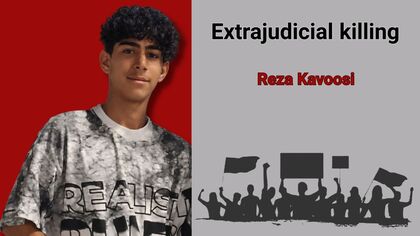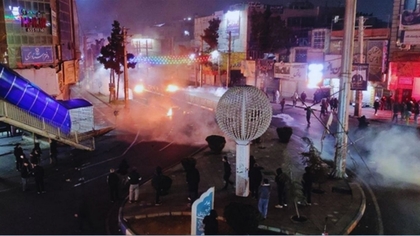The bomb will not save Iran from its deepening isolation
15:59 - 11 November 2011

Since the International Atomic Energy Agency released its latest report on Iran\'s nuclear ambitions, debate has focused on two options: stepping up international sanctions on Iran or a military attack on its nuclear facilities.
The sanctions option is already limping. Russia ruled out further United Nations sanctions, saying these would be seen as \"merely an instrument for regime change in Tehran\".
There are some incremental sanctions that Washington can impose, such as travel restrictions on named members of the regime, but no one expects these to stop Iran in its tracks.
A harsher option put forward by Washington hardliners, to destroy the Iranian economy by enforcing a boycott of the Iranian central bank, is fraught with danger. It would cripple Iranian crude exports, drive up oil prices in an already tight market, and perhaps deliver the death blow to hopes of global economic revival.
As for a military strike, aside from Israeli grandstanding, it is hard to find a serious military analyst who believes that bombing raids would do more than impose a small delay in Iran\'s progress towards mastering the nuclear fuel cycle. Such an attack would surely drive the Iranian leadership, which so far has stopped short of taking the final step towards creating a nuclear weapon, to go for broke.
President Barack Obama has no desire to start another war that would bring harm to US interests in the Middle East without having a clear prospect of victory or an exit strategy.
A year ago the future looked rosy for Iran, with the prospect of it establishing itself as the rising regional power. By the end of this year US troops will have withdrawn from Iraq, allowing Tehran a freer hand to oversee the government of its old enemy. US troops are meanwhile preparing to leave Afghanistan, Iran\'s neighbour to the east, which will also increase Tehran\'s authority there.
A few years ago Iran was described as being hemmed in by US proxy states. It will soon have broken out of this jail and, rather than being constrained by these countries, will be a central power in determining their fate.
This scenario might have looked convincing last year, before the Arab revolts broke out, but now it is distinctly threadbare. Iran\'s entanglement with its ally Syria, where a minority dynasty is crushing a popular rebellion, is changing perceptions.
Two years ago the Iranian president, Mahmoud Ahmadinejad, was a hero in many Arab capitals. Now the Arabs have their own heroes. Iran\'s clear pursuit of its own interests with Syria has exposed the hollowness of its revolutionary rhetoric.
One of the greatest achievements of Iran\'s 1979 Islamic revolution had been to perfect a universalist Muslim discourse that won popular appeal around the Islamic world. The fact that the country is ruled by a Shia theocracy which is very much the minority in Islam was buried under the heady talk of confronting America.
By standing with President Bashar Al Assad against the protesters, Mr Ahmadinejad now looks as hypocritical as some other leaders. The fact that the Iranian flag has been burned in Syria has not gone unnoticed in Tehran. Mr Ahmadinejad has tried to balance his position, offering to mediate between regime and protesters in case his ally is forced out. But the truth is clear: the toppling of the Assad dynasty would be a critical blow to Iran\'s regional reach. A continuing repression of the protesters by Syrian security forces would be a lingering embarrassment to Iran.
In this light Iran\'s position does not look so comfortable. As American troops prepare to leave Iraq, it is not hard to predict a new outburst of sectarian tensions between Sunnis and Shiites, with the government of Prime Minister Nouri Al Maliki forced to rely ever more on his Iranian backers. With Sunni Muslim Arab states supporting the Iraqi Sunnis, we could be looking at civil war.
There may come a time when Iran looks back with nostalgia on the time when America held the ring, and Iran\'s role was to creep below the radar, rather than taking responsibility.
Similarly, the dove of peace is unlikely to settle on Afghanistan as the Americans withdraw after a decade of war. The likelihood is greater involvement by Iran, and a greater burden of supporting Afghan refugees.
In none of these battlefields does it help to have nuclear capability, as the Americans have found to their cost.
Nor is Iran economically strong. Inflation is raging, and the government is struggling to protect the poor from the effects of food prices, rising up to 50 per cent a year.
Logic dictates that engagement with Iran is the only way to avoid what looks like a descent into chaos. It would be naive to think that this will be easy. Since the days of the Shah - with a break during the rule of Ayatollah Khomeini - Iran has maintained a long-term goal of being a nuclear-capable power.
No Iranian leader is going to abandon that goal. This certainly is not going to happen now, with Mr Ahmadinejad\'s succession in play, amid fierce rivalries in the ruling conservative camp. Nor is it a propitious time in the West, with Mr Obama facing re-election and the European Union poleaxed by the euro crisis.
But there really is no alternative to talks with Iran - on the conditions for future uranium enrichment and the fate of the material it has enriched. Attempts have failed in the past, or been subject to Iran\'s usual delaying tactics while it proceeds with building up its nuclear capacity.
The region has turned more complicated for everyone, and particularly Iran, with its alliance with Syria under threat and its economy in tatters. The regime may not see it that way; it may relish confrontation with America to distract attention from troubles at home. But all the alternatives to engagement are worse, for Iran and all the regional powers.
The National
The sanctions option is already limping. Russia ruled out further United Nations sanctions, saying these would be seen as \"merely an instrument for regime change in Tehran\".
There are some incremental sanctions that Washington can impose, such as travel restrictions on named members of the regime, but no one expects these to stop Iran in its tracks.
A harsher option put forward by Washington hardliners, to destroy the Iranian economy by enforcing a boycott of the Iranian central bank, is fraught with danger. It would cripple Iranian crude exports, drive up oil prices in an already tight market, and perhaps deliver the death blow to hopes of global economic revival.
As for a military strike, aside from Israeli grandstanding, it is hard to find a serious military analyst who believes that bombing raids would do more than impose a small delay in Iran\'s progress towards mastering the nuclear fuel cycle. Such an attack would surely drive the Iranian leadership, which so far has stopped short of taking the final step towards creating a nuclear weapon, to go for broke.
President Barack Obama has no desire to start another war that would bring harm to US interests in the Middle East without having a clear prospect of victory or an exit strategy.
A year ago the future looked rosy for Iran, with the prospect of it establishing itself as the rising regional power. By the end of this year US troops will have withdrawn from Iraq, allowing Tehran a freer hand to oversee the government of its old enemy. US troops are meanwhile preparing to leave Afghanistan, Iran\'s neighbour to the east, which will also increase Tehran\'s authority there.
A few years ago Iran was described as being hemmed in by US proxy states. It will soon have broken out of this jail and, rather than being constrained by these countries, will be a central power in determining their fate.
This scenario might have looked convincing last year, before the Arab revolts broke out, but now it is distinctly threadbare. Iran\'s entanglement with its ally Syria, where a minority dynasty is crushing a popular rebellion, is changing perceptions.
Two years ago the Iranian president, Mahmoud Ahmadinejad, was a hero in many Arab capitals. Now the Arabs have their own heroes. Iran\'s clear pursuit of its own interests with Syria has exposed the hollowness of its revolutionary rhetoric.
One of the greatest achievements of Iran\'s 1979 Islamic revolution had been to perfect a universalist Muslim discourse that won popular appeal around the Islamic world. The fact that the country is ruled by a Shia theocracy which is very much the minority in Islam was buried under the heady talk of confronting America.
By standing with President Bashar Al Assad against the protesters, Mr Ahmadinejad now looks as hypocritical as some other leaders. The fact that the Iranian flag has been burned in Syria has not gone unnoticed in Tehran. Mr Ahmadinejad has tried to balance his position, offering to mediate between regime and protesters in case his ally is forced out. But the truth is clear: the toppling of the Assad dynasty would be a critical blow to Iran\'s regional reach. A continuing repression of the protesters by Syrian security forces would be a lingering embarrassment to Iran.
In this light Iran\'s position does not look so comfortable. As American troops prepare to leave Iraq, it is not hard to predict a new outburst of sectarian tensions between Sunnis and Shiites, with the government of Prime Minister Nouri Al Maliki forced to rely ever more on his Iranian backers. With Sunni Muslim Arab states supporting the Iraqi Sunnis, we could be looking at civil war.
There may come a time when Iran looks back with nostalgia on the time when America held the ring, and Iran\'s role was to creep below the radar, rather than taking responsibility.
Similarly, the dove of peace is unlikely to settle on Afghanistan as the Americans withdraw after a decade of war. The likelihood is greater involvement by Iran, and a greater burden of supporting Afghan refugees.
In none of these battlefields does it help to have nuclear capability, as the Americans have found to their cost.
Nor is Iran economically strong. Inflation is raging, and the government is struggling to protect the poor from the effects of food prices, rising up to 50 per cent a year.
Logic dictates that engagement with Iran is the only way to avoid what looks like a descent into chaos. It would be naive to think that this will be easy. Since the days of the Shah - with a break during the rule of Ayatollah Khomeini - Iran has maintained a long-term goal of being a nuclear-capable power.
No Iranian leader is going to abandon that goal. This certainly is not going to happen now, with Mr Ahmadinejad\'s succession in play, amid fierce rivalries in the ruling conservative camp. Nor is it a propitious time in the West, with Mr Obama facing re-election and the European Union poleaxed by the euro crisis.
But there really is no alternative to talks with Iran - on the conditions for future uranium enrichment and the fate of the material it has enriched. Attempts have failed in the past, or been subject to Iran\'s usual delaying tactics while it proceeds with building up its nuclear capacity.
The region has turned more complicated for everyone, and particularly Iran, with its alliance with Syria under threat and its economy in tatters. The regime may not see it that way; it may relish confrontation with America to distract attention from troubles at home. But all the alternatives to engagement are worse, for Iran and all the regional powers.
The National



